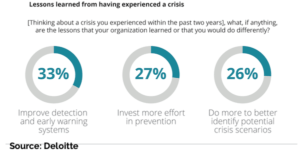
A new study from Deloitte indicates that it might be time to audit the crisis management plan. The study based on responses of 523 senior executives involved in risk, crisis management, and business continuity finds just 17 percent say their organizations have tested their crisis response plans. That’s way to low, says Deloitte, especially considering that 80 percent of respondents say they have had to put those plans in action to respond to a crisis at least once in the last two years, with cyber-incidents (46 percent) and safety issues (45 percent) occurring most frequently.
Meanwhile, nearly 60 percent of the respondents believe that organizations face more crises today than they did 10 years ago. And at least some respondents feel that the magnitude, as well as the number of crises, is growing. “Crises are becoming more intense as the world becomes more dynamic,” one respondent told Deloitte. “Any event can turn a simple situation into a massive one.”
To keep the confidence of all stakeholders, management must be able to mitigate the risks of major crises and steer organizations effectively through them. And indeed, perhaps spurred by the rising frequency of crises, organizations are taking action. For example, the vast majority of survey respondents say their organizations have crisis management plans in place. However, our findings also suggest that much more needs to be done if companies are going to avoid the financial and reputation damage that a major crisis  can inflict.
can inflict.
Nearly 90 percent of organizations have conducted reviews, mostly internally, following a crisis. The major insight from these examinations is that, although recent crises were not always foreseen, they might have been averted. This appears to prompt organizations to take action to forestall future crises. Respondents identified the need to improve detection and early warning signals, invest more effort in prevention, and do more to identify potential crisis scenarios as the top three lessons learned from their organization’s most recent crisis.


